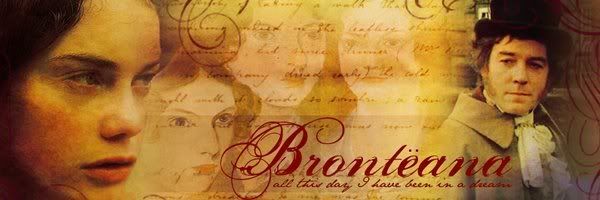Emma Brown and the morality of editing.
I forgot to mention yesterday that I brought up a Brontë adaptation, Emma Brown, in a course I am taking on editing practices. We had just finished collating two volumes of poetry by an obscure Canadian poet. The first edition of his works had been seriously tampered with. The editor chose to delete lines from the poems, and--worst of all-- add an entire stanza. She didn't bother mentioning that she had 'improved' these poems and the edition stood as the canonical text for about 50 years as I understand! Most of us were outraged, a few took the view that writing is a 'transition' and had no problem with it. To lead us on in the discussion, our teacher put forward the scenario of finishing a novel. Would it be right for someone to finish a novel? I suppose, in a sense, this is what 'Emma Brown' is supposed to be.
Emma Brown is a novel by Clare Boyland. It begins with the two chapter fragment 'Emma' written by Charlotte Brontë. I have no read anything about the author's purpose or plan for writing 'Emma Brown' and have looked at it in different ways. In short, and what I told my classmates, was that I find the idea of 'finishing' a novel interesting provided that the novel is seen as a new work (It might seem silly, but the editor of the Canadian poems clearly did not put these poems forward as new pieces). At home I have an antique volume which includes the Emma fragment and I also have 'Emma Brown'. I can read the fragment as Charlotte's work, and Emma Brown as Boyland's, and this is only fair.
Most of the reviews--if not all the reviews... okay ALL the reviews of Emma Brown comment on how 'like' a 'Brontë novel' it is, or is not. I am unsure how I feel about this. For one, it is uncharitable to Boyland that her work succeeds or fails only when matched with one of the greatest authors in English literature. Also, this is not a Brontë novel. However, in choosing to make use of Charlotte's fragment Boyland has to take responsibility for it in some way. It seems that she has tried to do so. The novel includes some underpinnings which include quotes from Charlotte's letters, and backstories culled from her juvenilia.
Is it right for someone to 'complete' Charlotte's 'Emma'? I believe it is. I think there could be a dozen attempts to work with it, and they could all be as individual as the author's writing them but they should not be so tightly bound to Charlotte's name and reputation. Of 'Emma Brown' itself, I will say that I found it to be a page-turner and a good mystery but found little statisfying in it beyond this.
Tuesday, September 27, 2005
Wierd Circle Wuthering Heights, and a Musical
As promised, here is my discussion of Wuthering Heights produced by 'Wierd Circle'. It was quite a few notched better and more mature than their version of Jane Eyre. I know that compressing most books, and great books down to a half-hour radio program is nearly impossible but this one shows that with careful editing it doesn't have to be disasterous. It still isn't good, but it's good enough--I suppose. The story is compressed mainly by cutting out the entire revenge plot from beginning to end, except for Hindley treating Heathcliff poorly (but there's no mention of anything other than ostracism going on). Heathcliff cries a little, thinking of getting revenge but this revenge never happens. It seems more like an immature thought which passes after he sobers up. He does return to the Heights but all that we learn of that is that Hindley invited him. He still marries Isabella 'for spite' but all that we know about the marriage is that Isabella 'isn't happy'. All of the past and present action takes place through the device of Cathy's diary and the explication of Nelly at the end. Lockwood remains at Wuthering Heights until he has heard the whole story. When he has told Heathcliff about Cathy's ghost, Heathcliff rushes into the snow to 'bring her back' and they find him frozen on her grave the next morning. I suppose what really keeps this version from the brink of the kind of absurdity of their version of Jane Eyre is the dialogue. There is only one line, said by Cathy, which seems silly and this is only in its delivery.
I don't remember mentioning this before, but a few months ago I also was introduced to the Wuthering Heights musical. Clips from the CD can be found here: http://www.amazon.com/exec/obidos/ASIN/B00009Y3OJ/qid%3D1123810368/sr%3D2-3/ref%3Dpd%5Fbbs%5Fb%5F2%5F3/103-1399124-4423806 My general impression was that it didn't work. I haven't heard the music for a while now, but while I liked the idea of an operatic attempt I don't feel that this one really did the job at all.
Posted by
Brontëana
at
8:43 a.m.
4
comments
![]()
Labels: jane eyre, jane eyre the musical, wuthering heights








